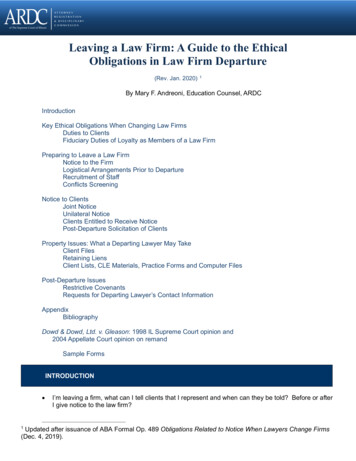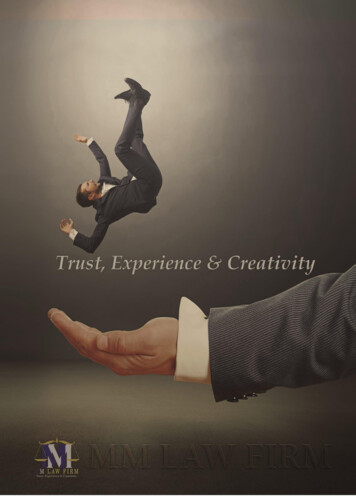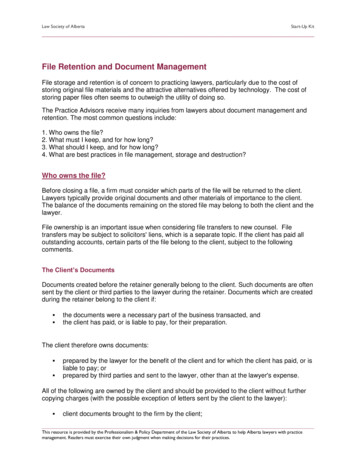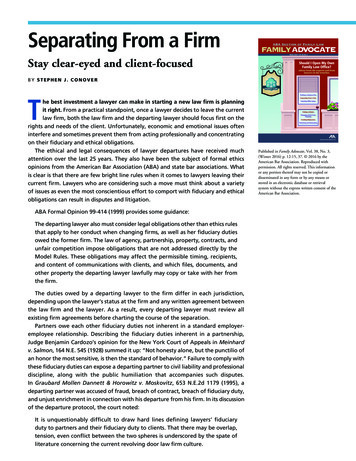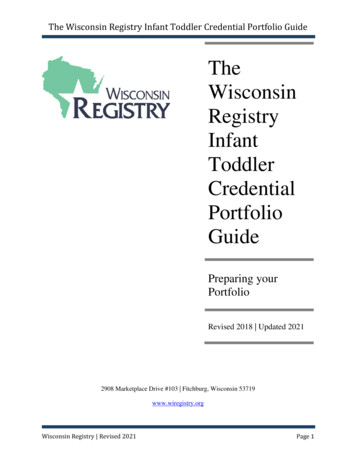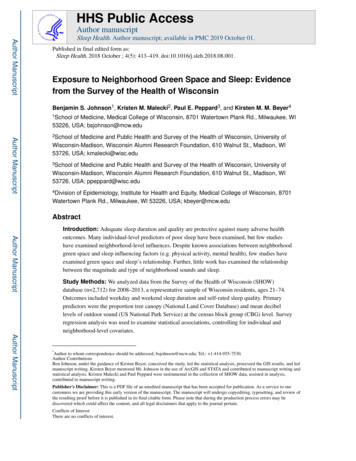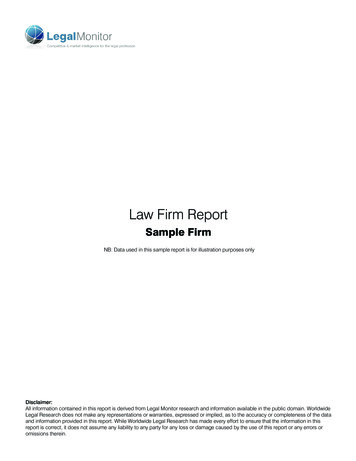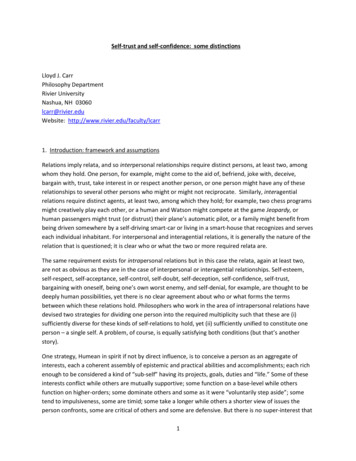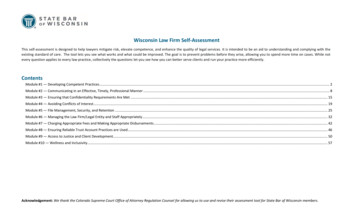
Transcription
Wisconsin Law Firm Self-AssessmentThis self-assessment is designed to help lawyers mitigate risk, elevate competence, and enhance the quality of legal services. It is intended to be an aid to understanding and complying with theexisting standard of care. The tool lets you see what works and what could be improved. The goal is to prevent problems before they arise, allowing you to spend more time on cases. While notevery question applies to every law practice, collectively the questions let you see how you can better serve clients and run your practice more efficiently.ContentsModule #1 — Developing Competent Practices . 2Module #2 — Communicating in an Effective, Timely, Professional Manner . 8Module #3 — Ensuring that Confidentiality Requirements Are Met . 15Module #4 — Avoiding Conflicts of Interest . 19Module #5 — File Management, Security, and Retention . 25Module #6 — Managing the Law Firm/Legal Entity and Staff Appropriately . 32Module #7 — Charging Appropriate Fees and Making Appropriate Disbursements . 42Module #8 — Ensuring Reliable Trust Account Practices are Used . 46Module #9 — Access to Justice and Client Development. 50Module #10 — Wellness and Inclusivity . 57Acknowledgement: We thank the Colorado Supreme Court Office of Attorney Regulation Counsel for allowing us to use and revise their assessment tool for State Bar of Wisconsin members.
Module #1 — Developing Competent PracticesSCR 20:1.1 requires lawyers to provide clients competent representation. This includes the requisite legal knowledge, skill, thoroughness, and preparation reasonably necessary for therepresentation. A lawyer should consider issues of competence when accepting a new matter and when substantively or procedurally expanding an existing matter. Examples include, wheneverthe lawyer addresses a new claim, files counterclaims, identifies other issues not previously considered, when unforeseen issues develop, when interpreting a contract previously drafted ornegotiated by the lawyer, or at any point when the procedural course or substantive nature of the matter deviates from that which the lawyer initially envisioned. This self-assessment toolprovides examples of issues to consider and resources to explore.QuestionWhen taking on new matters, do you assess whether you have thelegal knowledge and education to handle the matters?Does your assessment include your familiarity with: The applicable governing statutes, rules, regulations, and caselaw?YesNoEthical Implications The governing rules of procedure and court or applicabletribunal rules?Any recent changes in applicable substantive or procedurallaw?The factual context and subject matter? The governing Rules of Professional Conduct? If you do not have the legal knowledge to handle a matter, do youassess whether you can: Timely acquire the knowledge or education to handle the caseand whether you have resources available to do so? Learn from, associate with, or seek supervision or mentoring from alawyer with established knowledge in the relevant field? A lawyer must understand the substantive law(Disciplinary Proceedings Against Merriam, 2010 WI21) and the procedures (Disciplinary ProceedingsAgainst Grenisen, 2013 WI 99).A lawyer cannot delegate the duty of competence tothe client. See In re Shipley, 135 S. Ct. 1589- 90 (2015).A lawyer must not charge a client fees for time spentachieving competence. SCR 20:1.5. A lawyer shouldask, “Can I afford this obligation to get up-to-speedfor which I cannot charge (or bill to) the client?”A lawyer with a competence problem shouldimmediately seek assistance: covering upincompetence often results in far graver charges ofmisconduct.Competent representation requires the applicationof knowledge and skill, and the completion ofmeaningful work. See Disciplinary ProceedingsAgainst Bryant, 2015 WI 7; Disciplinary ProceedingsAgainst Lister, 2007 WI 55; Disciplinary ProceedingsAgainst Nunnery, 2009 WI 89.Other ResourcesAlan Gutterman, Practical Challenges ofMeeting Your Duties of Competenceand Diligence to Your Clients, LegalSolutions Blog (Thomson Reuters), July18, 2016.Christopher Sabis & Daniel Webert,Understanding the “Knowledge”Requirement of Attorney Competence:A Roadmap for Novice Attorneys, 15Geo J. Legal Ethics 915 (2002).Annotations to SCR 20:1.1, atwww.wicourts.gov/olr.See also Wisconsin Attorney's DeskReference.Dean R. Dietrich & Timothy J. Pierce,Limited Scope Representation andRecent Rule Changes, Equal JusticeConference, March 6, 2015.2
QuestionLimit the scope of representation to work within yourcurrent knowledge base or within the reasonablyexpandable scope of your knowledge base?YesNoEthical Implications Possibly handle the matter depending on whether the requiredproficiency is that of a general practitioner, or whether expertisein a particular field of law is required? Have the client provide informed consent (preferably inwriting after a full explanation of the competencies necessary)to a limited scope of representation?When taking on new matters, do you assess whether you havesufficient expertise, training, or access to mentoring or otherassistance such that you have the legal skills to handle the cases?(application of skills to black letter law) Limiting the scope of a representation must bereasonable, and generally requires the informedconsent of the client in writing. See SCR 20:1.2(c).Does your assessment include whether: You have handled matters in the same practice area before? Before retaining a lawyer from outside the lawyer’sfirm, the lawyer must obtain the client’s informedconsent. See SCR 20:1.1, comment 6.If a lawyer contracts with or retains lawyers outsidethe lawyer’s own firm to assist in the representation,the lawyer must reasonably believe that the otherlawyers’ services will contribute to the competentand ethical representation of the client. SCR 20:1.1,comment 6.If lawyers from more than one firm provide legal servicesin the same matter, the lawyers should consult with theclient and each other about the scope of therepresentation and the allocation of responsibility. SCR20:1.1, comment 7. You have handled client matters of similar complexity inthe past?The representation involves any special licenses or authorizations?The representation involves practice in other jurisdictions that wouldconstitute the unauthorized practice of law? You can analyze precedent, spot issues, evaluate evidence, anddraft legal documents in the new matters? You are familiar with and can employ relevant technologies andmodes of communication necessary for the representation? Other ResourcesMark Bassingthwaighte, Getting It Rightwith Client Selection (ALPS Corp.), Aug.26, 2014.Aviva Meridian Kaiser & Tison H. Rhine,Let’s Be Reasonable: The Ethics ofCybersecurity, Wis. Law. (Oct. 2016).3
QuestionThe new matters involve compliance with different rules,regulations, or procedures than those with which you have had priorexperience?YesNoEthical ImplicationsOther ResourcesIf you do not have the skills-based competence to handle a newmatter, do you assess whether you can: Timely acquire the skills necessary to handle the matter? Limit the scope of your representation to work within your currentskill set or within the reasonably expandable scope of your skill set? Learn from, associate with, or seek mentoring or supervisionfrom a lawyer with established skills in this field? A lawyer must keep abreast of the benefits and risksassociated with relevant technologies. See SCR20:1.1, comment 8. Lawyers might not have reasonable access to thedocumentation necessary to make appropriatefactual assertions and legal arguments. Lawyers thuswill need the time to develop what is necessary toadequately perform the representation.Failure to spend time investigating the factual andlegal bases for an action could earn an adverse findingthat a matter is frivolous or could expose a lawyer tosanctions.Making representations without due diligence orexpressing insufficiently qualified opinions may violateduties to third parties under the Rules of ProfessionalConduct and other sources of legal authority.Before taking on new matters, do you ask whether you have thenecessary resources (time, finances, staffing, infrastructure, outsideadvice, and willingness) available to adequately prepare and offerthorough representation? Does your assessment include whether youhave the following:TIME To handle a potential new matter without neglecting existingprofessional or personal obligations? Conversely, whether otherobligations impede providing adequate representation? To investigate and develop the factual aspects of the casesyou undertake? Standing Comm. on Ethics & Prof’lResp., Am. Bar Ass’n, Ethics Op. 06-441,Ethical Obligations of Lawyers WhoRepresent Indigent Criminal DefendantsWhen Excessive Caseloads Interferewith Competent and DiligentRepresentation (2006).Disciplinary Proceedings AgainstNunnery, 2009 WI 89 (suspendinglawyer for two months for notconducting a meaningful inquiry intoveracity of documents presented by4
QuestionTo investigate and develop all legal aspects of the cases? Clients who have needs or preferences that require additionaltime? If so, whether you have the time, patience, or resources tohandle the cases properly? An issue such that it would be prudent to refer the matters to a lawyerwith the skill set and time to investigate and handle therepresentation?FINANCIAL RESOURCES AND RESERVES Fees that will support developing both the factual bases and thelegal aspects of the matters you undertake? YesNo Ethical ImplicationsLawyers are required to inform themselves about thefacts of their clients’ cases and the applicable law.See SCR 20:3.1, comment 2.Advanced fees may be received, but must be kept intrust until earned and notice given to the client; ormust be in compliance with the advanced feealternative. See SCR 20:1.5(f), (g), (h). Staff with the knowledge and training to handle the cases?client).Frank T. Lockwood, Reinventing ClientSelection and Case Management, GPSolo, (July/Aug 2014).Mark Bassingthwaighte, Getting It Rightwith Client Selection (ALPS Corp.), Aug.26, 2014.Legal Fees and Costs Under theWisconsin Supreme Court Rules, atwww.wicourts.gov/olr, link to “lawyerfees.”A business model that allows you to assume the financial riskinvolved if problems arise in the representation?A business model that supports access to the professional advice ofothers who can assist you to understand the technical aspects of thematters you take on, be they attorneys, accountants, engineers, orother experts? Sufficient financial liquidity to support the fee structure orpayment timing of the representation? The ability to modify your fee structure so that you can provideadequate representation?STAFFING Sufficient staff-hours available as well as competent staff to handlethe new matters?Other Resources Lawyers with supervisory authority over non- lawyersmust make reasonable efforts to ensure that theperson’s conduct is compatible with the professionalobligations of the lawyer. SCR 20:5.3(b).Mark Bassingthwaighte, Getting It Rightwith Client Selection (ALPS Corp.), Aug.26, 2014.Dean R. Dietrich, Ethics: Supervising5
QuestionStaff members who have the skills to handle the cases?YesNoEthical ImplicationsOther ResourcesLawyers: Accountability for Others’Work, Wis. Law. (Mar. 2012).If your staff lacks competency to handle a case, you can:o Timely hire the necessary staff?o Timely train existing staff to ensure that they haveadequate knowledge or skills to handle the matter?o Appropriately supervise the necessary staff?INFRASTRUCTURE Access to research resources to answer legal questionspresented by cases? Systems in place to handle the electronic data involved in thematters you accept? Ability to contract with or retain other lawyers, if necessary, whohave the infrastructure to handle matters for which you do nothave adequate infrastructure?ADVICE A relationship with at least one other lawyer whom you couldconsult for advice or assistance as to substance, procedure, orquestions of judgment if needed? SCR 20:1.1, comment 8 (lawyers must keep abreast ofthe benefits and risks associated with relevanttechnology).Ellie Margolis, Surfin’ Safari – WhyCompetent Lawyers Should Research onthe Web, 10 Yale J. L. & Tech. 82 (2007)(noting rules of professional conduct,read together, “create an ethicalobligation to perform sufficientresearch to effectively advocate onbehalf of a client”).Aviva Meridian Kaiser & Tison H. Rhine,Let’s Be Reasonable: The Ethics ofCybersecurity, Wis. Law. (Oct. 2016). Without a sounding board or someone who can offera different perspective, lawyers can fall prey to badjudgment and echo-chamber thinking.ABA Formal Opinion 98-411: EthicalIssues in Lawyer to Lawyer Consultation.State Bar of Wisconsin’s lawyer-to-lawyerdirectory is a database of hundreds oflawyers who agree to share theirknowledge with other attorneys,www.wisbar.org/lawyer2lawyer. Receive regular, honest, and relevant feedback on your workproduct?6
QuestionYesNoEthical ImplicationsOther ResourcesWILLINGNESS Cases that are sufficiently interesting to develop the factual basesand legal theories? Constraints in providing competent representation by yourpersonal circumstances (including medical issues) or your personalfeelings about the client or the matter? A representation that creates any peer pressure or image issues withwhich you are not able to reasonably cope? An unwillingness to take a case, such that it would be prudent torefer the matter to a lawyer with the requisite skill set and interestto investigate and handle the matter? An unwillingness to take a case, what form and substance thecommunication(s) declining the representation should take?7
Module #2 — Communicating in an Effective, Timely, Professional MannerCommunicating clearly with your client contributes to a healthy, thriving law practice. Communication problems are a common type of client complaint seen in the Office of Lawyer Regulation.Communicating clearly with a client includes ensuring that you receive client communications and engage in mandatory duties of communication.SCR 20:1.4 addresses a lawyer’s duties to communicate with the client. The rule is mandatory, not permissive. Lawyers must communicate with clients about certain things related to therepresentation and do so in a timely manner. Notably, SCR 20:1.5(b) requires the communication of information concerning fees charged, costs, expenses, and disbursements to the client. Otherprocedures not mandated by the Rules can nonetheless help prevent client misunderstandings that often lead to ethics complaints. Creating written policies establishing minimumcommunication standards expected of you, your employees, and your clients goes a long way toward this goal.QuestionCommunication Regarding the Scope of theRepresentation and FeesWhat procedures and forms do you have or steps doyou take to ensure that you and your clients share thesame understanding of the terms and scope of theengagement letter and fee agreement?What procedures and forms do you use to ensure yourclients understand the fees and expenses for which theyare responsible?YesNoN/AEthical Implications It is essential that both the client and the lawyerunderstand the terms of the representation and thefees to be charged for services. This reduces disputesas to what services were or were not contemplated. SCR 20:1.5(b) requires lawyers to inform clients ofthe scope of the representation and the basis or rateof fees and expenses.Other ResourcesDean R. Dietrich, Ethics: Lawyers Owe Clients‘Reasonable’ Communication, Wis. Law. (June2011).8
QuestionClient Communication PoliciesDo you have a written policy regardingcommunication with clients? Does it:YesNoN/AEthical ImplicationsOther Resources Even if your practice does not have a writtencommunication policy, you should evaluatewhether you address with clients thecommunication issues raised in the five followingquestions. You may want to consider developing apolicy that addresses these issues. Does the policy promote compliance with allsix ethical obligations to communicate required bySCR 20:1.4? Do you ensure whether the client ordesignated client contact is authorized to makedecisions on behalf of the client or whetherfurther authorization is necessary? SCR 20:1.4, comment 4: “regular communication willminimize the occasions on which a client will need torequest information.” Communicating clearly with your client contributes toa healthy, thriving law practice. A communication policy promotes regular and timelyclient contact. Consider providing clients with a copyof your policy to avoid confusion over communicationexpectations and timeframes. SCR 20:1.4(a)(1)-(5), and (b). Include addressing with clients theirappropriate and preferred methods ofcommunication such as phone, mail, email, andtext? SCR 20:1.4, comment 4: “[a] lawyer’s regularcommunication with clients will minimize theoccasions on which a client will need to requestinformation concerning the representation.”Dean Dietrich, Ethics: Handling Clients’ TextMessages, Wis. Law. (April 2016). Address the expected response time for clientinitiated phone calls, emails, or texts, and is thatresponse time communicated to clients? SCR 20:1.4(a)(3).Dean Dietrich, Ethics: Lawyers Owe Clients'Reasonable' Communication, Wis. Law. (June2011). Establish when changes/status updates in cases willbe relayed to clients and have you communicated this toyour clients? SCR 20:1.4(a)(1).Annotations to SCR 20:1.4,www.wicourts.gov/olr.Mark Bassingthwaighte, Communication – It’sAll in The Details (ALPS Corp.), 2015.Mark Bassingthwaighte, Manage ClientRelationships in Addition to Client Matters (ALPSCorp.), 2016.Thomas J. Watson, Managing Risk: HeightenedStandard of Care When Communicating WithClients in the Digital Age, Wis. Law. (Dec. 2009).9
Question Address the expected frequency of lawyerinitiated updates on the case when there is noactivity? Ensure that clients receive copies of importantcorrespondence sent and received?YesNoN/AEthical Implications SCR 20:1.4, comment 6.Other Resources SCR 20:1.4. Ensure clients are aware of scheduled events?Do you have a process to ensure continued compliancewith client communication expectations or any writtenclient communication policy by your associates andstaff? Staff compliance with client communication policiespromotes your compliance with SCR 20:1.4. If youhave a policy, do you: 1) require staff to read and signthe policy, 2) regularly review it with staff, 3) assesscompliance as part of performance reviews?Do you assess your own compliance with clientcommunications expectations set out for yourpractice or in a written communication policy?Do you have a policy or system in place that confirms inwriting any text or phone-based client communication? You should assess your compliance with the policy tomeet your professional obligations.Dean R. Dietrich, Ethics: Duty to Communicatewith Client, Wis. Law. (Dec. 2009). The use of texting to communicate with clients hasbecome more common but creates its own issues.For example, some mobile phone companies retaintexts for only a short time. It is important to maintaina record of text communications independent ofrelying upon the ability to subpoena them.Thomas J. Watson, Managing Risk: Keeping ClientInformation Safe Until Disposal, Wis. Law. (Mar.2016).10
QuestionDo you archive email conversations with clients andensure they are copied to the file?YesNoN/AEthical Implications Archiving emails documents client instructions to thelawyer and lawyer instructions to the client. It alsoprovides evidence of case updates sent to the client.See SCR 20:1.4.Other ResourcesWisconsin Ethics Op. EF-16-03: The EthicalObligation of the Lawyer to Surrender the Fileupon Termination of the Representation.Wisconsin Ethics Op. EF-17-01: Retention andDestruction of Closed Client Files.See Wisconsin Ethics Opinions.Marian C. Rice, Email Communications withClients, L. PRACTICE MAG., Jan./Feb. 2013.Christopher C. Shattuck, Managing Your DigitalFiles, Wis. Law. (June 2018).Do you have clients confirm their instructions to you inwriting? Confirming instructions in writing reduces confusionover whether the client authorized a course of action.SCR 20:1.2 and SCR 20:1.4.Mark Bassingthwaighte, If You Failed toDocument It, It Never Happened (ALPS Corp.),Jan. 18, 2017.Thomas J. Watson, Risk Management: DocumentEverything: It’s Vital to Managing Risk, Wis. Law.(Mar. 2017).General Considerations forCommunications with ClientsDo you communicate in a manner that isrespectful of clients and their needs?Do you address language barriers, if any, inagreeing to represent a client? SCR 20:1.6. SCR 20:8.4(ii). SCR 20:1.5.Lisa Bliss, Representing Clients with LimitedEnglish Proficiency, Litig. News, Oct. 13, 2010.11
QuestionDo clients need to designate someone else with whomyou can communicate on their behalf about the matter?Do you have a standard engagement letter thatcommunicates: Expected fees?Billing policies?Services covered?How and when the relationship will beterminated?A disclaimer that no specific outcome isguaranteed?YesNoN/AEthical Implications If the client grants permission for you tocommunicate with someone else on the client’s youshould discuss any limitations on thosecommunications, potential confidentiality issues thatmay arise, and confirm in writing. SCR 20:1.5(b) requires attorneys to provide clientswith a written “basis or rate of the fee and expenses”within a reasonable time of beginning therepresentation.Other ResourcesWisconsin Ethics Op. E-09-03:Communications Concerning Attorneys Feesand Expenses.See Wisconsin Ethics Opinions.Letters, GP Solo, Jan./Feb. 2007.“Legal Fees and Costs Under the WisconsinSupreme Court Rules,” at www.wicourts.gov/olr.Thomas J. Watson, Risk Management:Engagement Letters – Protection You Don't Wantto Live Without, Wis. Law. (May 2017).Timothy J. Pierce, New Trust Account Rule;Lawyer Fees and Fee Agreements Wis. Law.(June, 2007).Do you have a termination of engagement letter? A closing letter prevents confusion as to whether theattorney still represents the client if there issubsequent litigation.ALPS Corp, (Sample Closing Letters).Dean R. Dietrich, Ethics: Engagement Letters –Protection You Don't Want to Live Without, Wis.Law. (April 2007).12
QuestionIf a client refuses to follow your advice, do youdocument your recommendations that the clientrefused to follow, the reason(s) you made therecommendations, and your explanation to the clientof the risks of not following the advice?YesNoN/AEthical Implications SCR 20:1.4(b).Other ResourcesMark Bassingthwaighte, If You Failed toDocument It, It Never Happened (ALPS Corp.),Jan. 18, 2017.Do you provide clients with regular cost updates at afrequency and in a form that suits their needs?Are clients informed of what is expected of themduring the course of the representation?Communication with Prospective ClientsAre your advertisements, including your website, freeof false or misleading statements?Do your advertisements contain any statements thatare likely to create an unjustified expectation ofresults? Clients need to understand their obligations in theattorney-client relationship. This includes truthfulinformation, timely communication, and updatedcontact information. Statements about you/the firm must beindependently verifiable. SCRs 20:7.1 & 7.2.Better Business Bureau, Code of Advertising. SCRs 20:7.1 & 7.2.Better Business Bureau, Code of Advertising.Dean R. Dietrich, Ethics: Rules for Marketing withSocial Media, Wis. Law. (May 2010).Client Feedback. Do you or your firm:Conduct client surveys, interview clients, or otherwiseseek feedback to assess client satisfaction with therepresentation? Client surveys and interviews allow you to identifywhat is working well for clients and what is not. Theymay also reveal areas where your practice canimprove compliance with professional obligations.Best Practices: Solicit and Respond to ClientFeedback, FindLaw.com (Feb. 9, 2017).Lynn Luong, Law Firm Client Relations: How toGet Client Feedback That You Can Use,AboveTheLaw.com (Nov. 9, 2016).13
QuestionHave policies and procedures in place for addressingclient complaints?YesNoN/AEthical Implications Addressing complaints improves attorney-clientrelations and may avoid professional responsibility orliability complaints.Other ResourcesChris Hargreaves, 4 Types of Challenging Clients,Wis. Law. (May 2018).14
Module #3 — Ensuring that Confidentiality Requirements Are MetSCR 20:1.6 addresses confidentiality of client information and when disclosure is prohibited or permitted. Confidentiality applies to matters communicated in confidence by the client, and to allinformation relating to the representation, whatever its source. A lawyer may not disclose such information except as authorized or required by the Rules. [Cmt. 3 to SCR 20:1.6]. Confidentialitysurvives the conclusion of the attorney-client relationship.Many issues regarding disclosure of confidential information are preventable; thus, written policies to educate lawyers and staff, and review of such policies through the following form, willaid in preventing such disclosures. If you do not have a written policy, you still must consider whether you are taking appropriate steps to protect confidences. Technology presents additionalissues, which are not always obvious, and therefore, while preventable, must first be identified as an area of concern.QuestionCONFIDENTIALITY POLICY FOR EMPLOYEESDo you have written policies for lawyers and supportstaff explaining duties to preserve client confidences? Ifnot, consider developing written policies that includethe criteria discussed below. If you do have policies, youmay wish to consider the following criteria to buildpractices that protect client confidences. Do you present your policies regarding clientconfidences at new employee orientation? Do youhave new employees sign that they have reviewedthese policies?YesNoN/AEthical Implications Misunderstanding the breadth of SCR 20:1.6 andthe differences between confidentiality and lawyerclient privilege.Ensuring adequate training for staff, SCR 20:5.1(a)and SCR 20:5.3(a).Inadvertent disclosure such as including the wrongparties in a confidential client email (see also SCR20:4.4).Perils of using social media to discuss work.Discussing “hypotheticals” with another lawyerwhere confidential information is provided (see SCR20:1.6, comment 4).Posting responses to online reviews of thelawyer’s services.Inadvertently providing other client files or clientinformation when returning client files.Improperly disposing of or storing clientinformation.Posting client names and case results on law firmwebsite without client authorization.Other ResourcesWisconsin Ethics Op. EF-17-02: Duty ofConfidentiality; Identities of Current and FormerClients.Wisconsin Ethics Op. EF-15-01: Ethical Obligationsof Attorneys Using Cloud Computing.Ethical Dilemma ED-2014-08-20.See Wisconsin Ethics Opinions.Disciplinary Proceedings against Harman, 2001 WI71.Allison Shields, Prevent Confidentiality Leaks inYour Firm, Lawyerist.com (March 5, 2010).Annotations to SCR .15
QuestionDo your policies address when to obtain clientconsent for disclosure?YesNoN/A Ethical ImplicationsSCR 20:1.6(a); SCR 20:1.0(f).Lawyers may want to memorialize a client’s consentto disclosure so that both parties are clear about thescope of authorization and when it was made.Other ResourcesSCR 20:1.6, comment 2.Dean R. Dietrich, Ethics: Obtaining Client’s‘Informed Consent’ to Disclose Information, Wis.Law. (Nov. 2010).Dean R. Dietrich, Ethics: Impliedly AuthorizedDi
Acknowledgement: We thank the Colorado Supreme Court Office of Attorney Regulation Counsel for allowing us to use and revise their assessment tool for State Bar of Wisconsin members. Wisconsin Law Firm Self-Assessment This self-assessment is designed to help lawyers mitigate risk, elevate competence, and enhance the quality of legal services.
